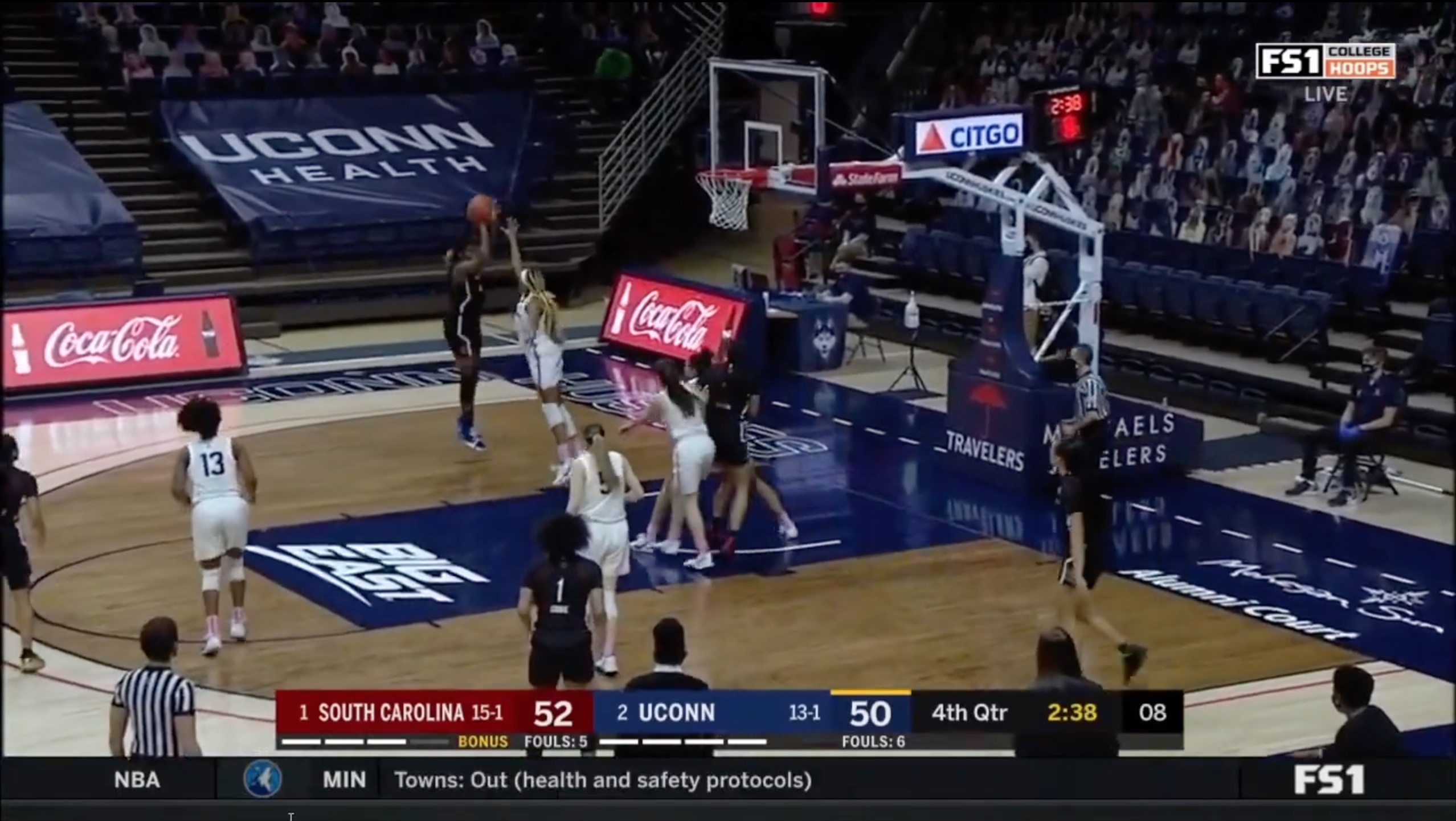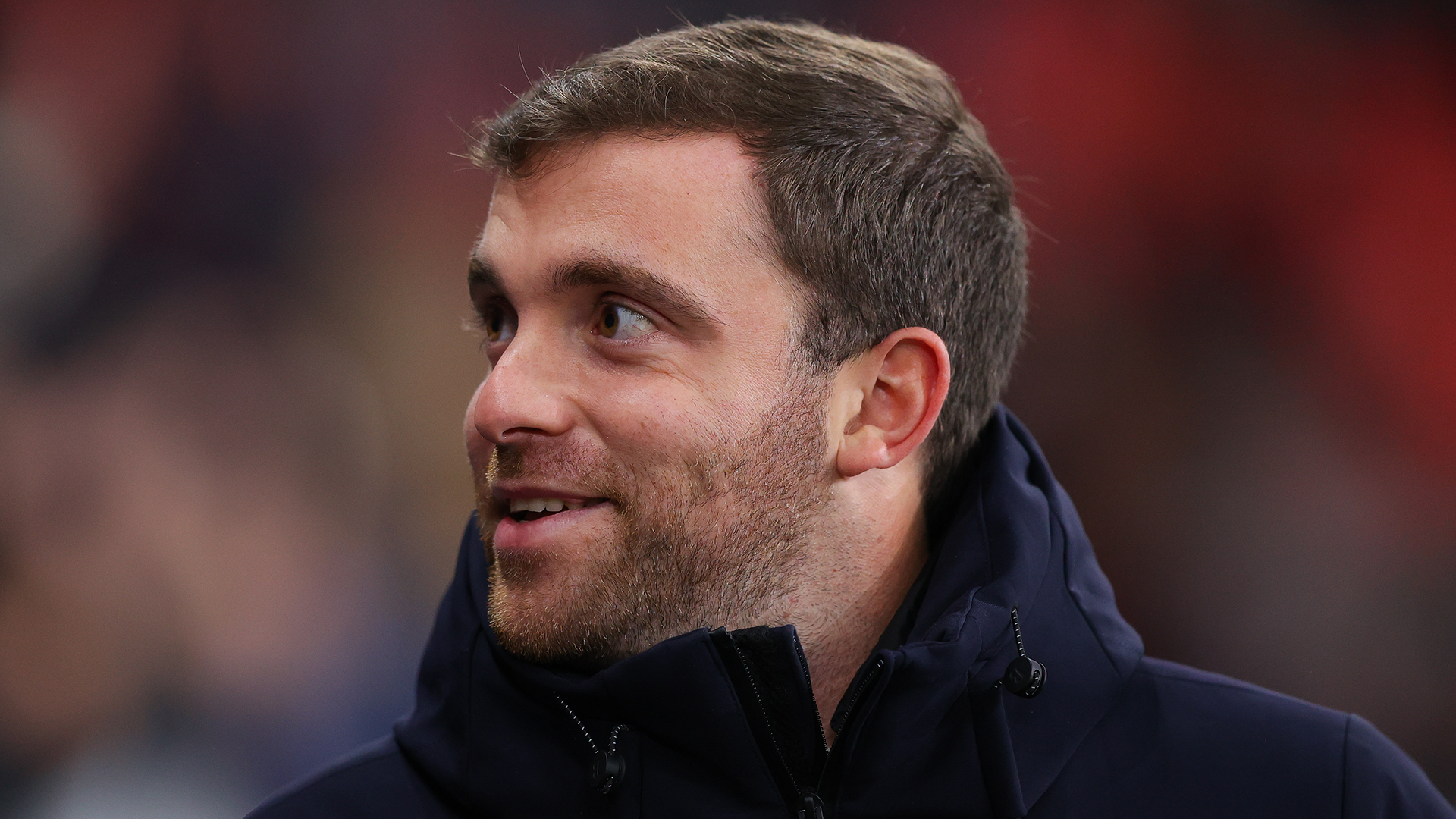What's so great about Aliyah Boston, the 6-foot-5 sophomore center at South Carolina who might be my favorite player in college basketball? The short answer is: She’s very cool. If that sounds unsophisticated, well, that’s sort of the point. The online basketball analysis industry has trained my eyes to search for schemes and sets only visible in complicated diagrams and slow-mo clips. Forget those, Boston says. The things she’s good at require no particular connoisseurship to appreciate: blocks straight out of a volleyball match, nimble footwork, rebounds yanked down almost theatrically. She blends grace and pure power better than anyone else; in doing so, she makes the experience of watching a complicated game something visceral and fun.
The long answer is Monday night’s South Carolina-UConn game, which the No. 1 Gamecocks lost in a 63-59 overtime heartbreaker. No. 2 UConn's freshman guard Paige Bueckers made this very much a Paige Bueckers Game with some last-minute heroics. (She has a way of doing that.) After Boston helped put together a late 11-0 South Carolina run to give the Gamecocks a 54–50 lead, Bueckers made two straight jumpers to tie it up. South Carolina's four missed opportunities from point-blank range (Boston looked like she was fouled in one, but didn't get a call) in the last possession of regulation led to overtime, where Bueckers scored all of UConn's nine points—it would be her third consecutive 30-point game—and won the game with a catch-and-shoot three that hit the rim and bounced a high and lucky bounce.
PAIGE. GETS. BUCKETS.@paigebueckers1 gets the bounce in OT to seal the win for @UConnWBB 🔥 pic.twitter.com/yMqfZj0TUq
— FOX College Hoops (@CBBonFOX) February 9, 2021
One highlight doesn't tell the full story. In fact, this one, with its suggestions of Husky risk-taking, may misrepresent what was often a gingerly "the paint is lava" exercise for UConn. Boston, who finished with a relatively quiet 17 points and 15 rebounds, is the rare player whose defensive prowess needs to be accounted for on offense. It says something about Boston—the mere specter of her—that UConn was shooting terribly for most of the game, and still wasn't really even trying to drive to the basket while she was on the floor, even in one of her less dominant performances. And why would they? There's no real chance of converting when Boston is there, and they'd watched enough scouting tape to know that.
WOMENS HOOPER WEDNESDAY- 6’5 South Carolina Freshman F Aliyah Boston is DOMINANT. The St Thomas, Virgin Islands native averaged 12.5 PPG 9.4 RPG 2.6 BPG this past season while also being named National Freshman of the Year. FUTURE WNBA FIRST ROUND PICK 💯💯 @aa_boston pic.twitter.com/9pIw7bFgwB
— Frankie Vision (@Frankie_Vision) September 30, 2020
There's a clip of Hassan Whiteside doing a postgame interview a few years ago: “I see a lot of guys in the NBA getting triple-doubles with assists,” he said, after finishing with a 19-point, 17-rebound, and 11-block triple-double against the Nuggets. “Ain’t nobody doing it with blocks. So, I knew I had to come out here and um—” Here he turned to the camera to repeat himself. “Nobody’s doing it with blocks.”
Aliyah Boston has been doing it with blocks. Her second career triple-double came three weeks ago against Georgia, though her 10 blocks then may have been overshadowed by—agh!—the Paige Bueckers game-icer at Tennessee that same night. (It was a fun eight hours for the women's basketball fan; that afternoon, Michigan's Naz Hillmon put up 50 points in a loss.)
Boston, appropriately, says her WNBA idol is Candace Parker, who boasted similar stat lines in college. “She just does everything she needs to, and everything just always looks good," Boston told The Athletic. "She can attack off the dribble, she can also post you up and knock down the 3. So … just being able to develop all of that would really help me.” That would really help her; it would be terrifying, too. Watching Bueckers or Boston each command her own team as an underclassman, I kept having to remind myself that they both have years left with their college programs. If they both look pro-ready now, they're still on the undeveloped side, relative to their ceilings.
Some women's college basketball fans consider it a special attraction of the game that this is a one-and-done-free sport, which, sure, the fucked up corollaries of rotten labor systems can be appealing in their own way. The WNBA’s age requirement forces everyone to stick around the NCAA for three years at least, and few players choose to leave early when they can. (The opportunity cost of staying in college and finishing a degree is a few million dollars less for women than it is for the men.) It doesn't help that WNBA rosters don't come close to absorbing even the game's senior talent each year, and unless the league expands, the problem will only get worse. In the last collective bargaining agreement, team salary caps weren't raised to the degree player salaries were, and teams have mostly chosen to drop their 12th roster spot to account. Fix it! Fix it now, I say! If last night is any indication of how talented and precocious the field is becoming, the WNBA would do best to make lots of room for its future stars.






